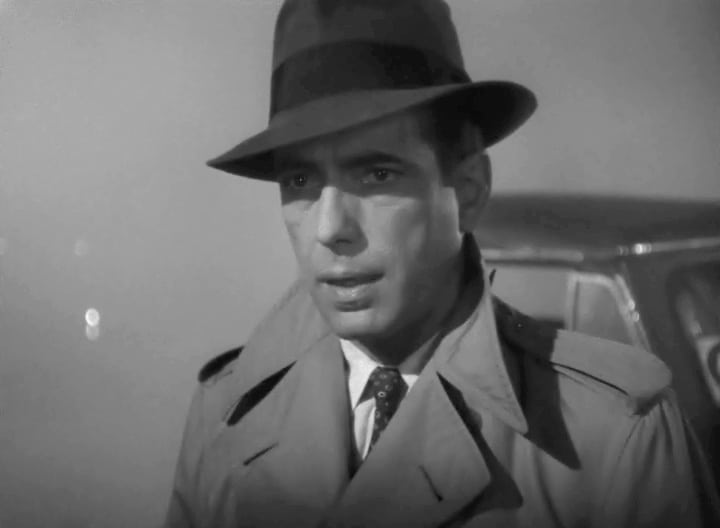Some misquotes have become part of the American lexicon, known to be inaccurate but frequently repeated anyway. One example of this is Humphrey Bogart’s line as Rick Blaine in Casablanca, “…play it again Sam.” Bogie never said that line in the film, nor did his costar Ingrid Bergman, though their characters both asked Sam, played by Dooley Wilson, to play As Time Goes By. The line even became the title of a play and film spoofing Bogart and Casablanca, directed by Woody Allen. It is probably one of the most misquoted statements attributed to Bogart, indelibly linked to him, despite his never having said the words.
In history there are many such examples that are similar, some are misattributions, some fabrications, and some shared by more than one figure. Some are simply urban legends, their origin unknown. Vince Lombardi claimed repeatedly that he never said, “Winning isn’t everything; it’s the only thing,” but that has never stopped him from being misquoted by amateur football coaches and less than thorough reporters. He did often quote another head coach, Red Sanders, as having said, “Winning isn’t a sometimes thing; it’s an all the time thing.” The first line remains part of Lombardi’s legend though, and it isn’t likely to change anytime soon.

ADVERTISEMENT - CONTINUE READING BELOW
Here are ten misattributed quotes from historic figures which have gained credibility over time, despite being provably false.

ADVERTISEMENT - CONTINUE READING BELOW
Isoroku Yamamoto in the aftermath of Pearl Harbor
In motion picture Tora! Tora! Tora! Admiral Isoroku Yamamoto, commander of the Japanese fleet, remarks of the success of the attack on Pearl Harbor, “I fear all we have done is to awaken a sleeping giant and fill him with a terrible resolve.” The line was repeated in another, later motion picture, Pearl Harbor, in 2001. It has been repeated in magazine articles and websites and is often quoted as evidence that Yamamoto was opposed to opening war with the United States, having seen first-hand its immense industrial capacity. The problem is that there is no documented evidence of Yamamoto ever uttering the statement or writing it down.
It is true that Yamamoto entered the planning phase for the Pacific War reluctantly, convinced that Japan could hope for no better than a negotiated peace with the United States after administering swift and deadly blows on its unprepared enemy. It was a gamble undertaken in the hope that a series of defeats in the Pacific, where Japan intended to build its empire in order to obtain raw materials while reducing dependence on the west, would preclude a protracted war. Yamamoto had toured the United States and knew well of its mineral wealth and industrial capability.
He also knew that the American fleet as represented by the battle line at Pearl Harbor was inferior to the Japanese in terms of modernity and that the United States was unready for carrier warfare, still operating under the theory that the war would be decided by the battleships and their big rifles. Yamamoto led the Japanese attack believing that the United States government would receive notice of a state of war just prior to the Japanese planes appearing over Pearl Harbor. The inept performance of the Japanese decoders in Washington ensured that his attack was unannounced and unprovoked.
ADVERTISEMENT - CONTINUE READING BELOW
Numerous diaries and logs kept by the Japanese note Yamamoto’s evident depression following the attack, all the more obvious when compared to the celebrations held by more junior officers. When the fleet returned to Japan Yamamoto noted in a letter that there was no pride to be had for having “smitten a sleeping enemy”, but he made no comments as to what he expected that enemy to do, other than react in “a determined counterattack.” Yamamoto commented that in striking a sleeping enemy the attacker should feel shame, rather than the unaware victim of the attack, hence the likely cause of his depression.
Both the producer of Tora! Tora! Tora! and its screenwriter claimed to have seen the quote in writing, the former in a diary and the latter in a letter, but neither ever produced the documents, and neither Japanese nor American historians and researchers have ever found them. Nor has any historian found any other reference to the quote. Pearl Harbor‘s director stated that he referenced the earlier film as his source. Finally, the quote is out of sync with Yamamoto’s character as a naval officer and Japanese warrior. There is no reference to it earlier than the 1970 release of Tora! Tora! Tora! and as such its attribution to Yamamoto is most likely false.

